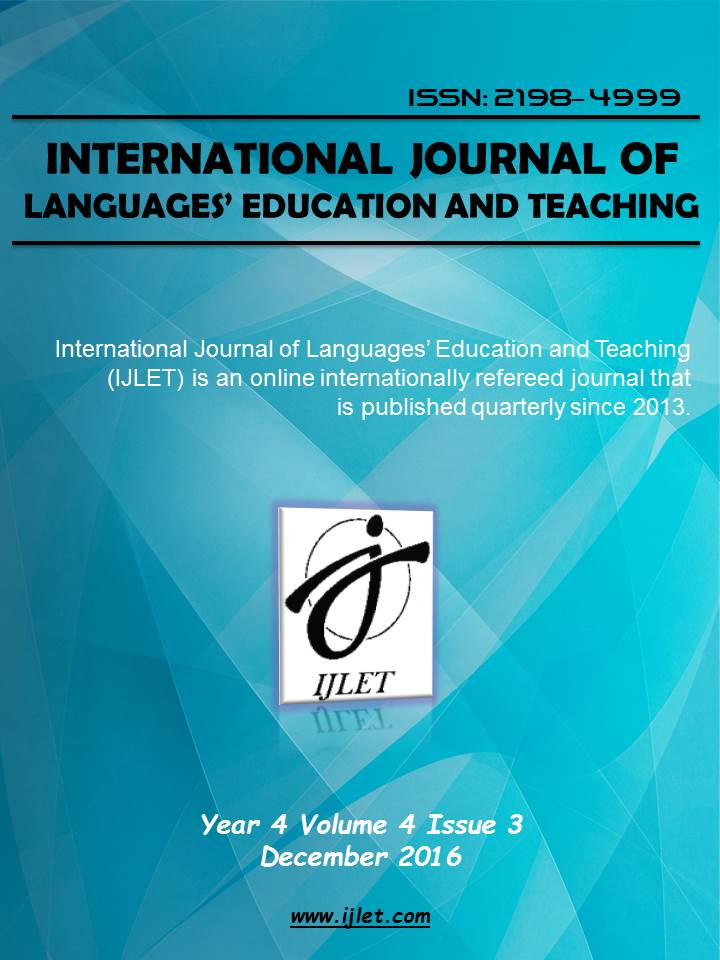Perceptions of In-Service EFL Teachers Regarding the Features of an Effective Peer Coach in the Process of Professional Development
Author :
Abstract
Creating a non-threatening, non-evaluative environment for the teachers to improve some aspects of their teaching, peer coaching aims to promote teachers’ professional development by contributing to the efficacy of the teachers and teaching process. Despite a great number of studies conducted on the effectiveness or impact of peer coaching in the field of pre-service EFL teacher education or in-service EFL teacher training, the issue of what features the EFL teachers attribute to an effective peer coach has not been dealt with adequately. In this respect, the present study aimed to investigate the key features of an effective peer coach from the perspectives of four EFL teachers via Rep-Grid analysis technique and follow-up interviews. The results suggested different features attributed to an effective peer coach as based upon the teachers’ prior experiences.
Keywords
Abstract
Creating a non-threatening, non-evaluative environment for the teachers to improve some aspects of their teaching, peer coaching aims to promote teachers’ professional development by contributing to the efficacy of the teachers and teaching process. Despite a great number of studies conducted on the effectiveness or impact of peer coaching in the field of pre-service EFL teacher education or in-service EFL teacher training, the issue of what features the EFL teachers attribute to an effective peer coach has not been dealt with adequately. In this respect, the present study aimed to investigate the key features of an effective peer coach from the perspectives of four EFL teachers via Rep-Grid analysis technique and follow-up interviews. The results suggested different features attributed to an effective peer coach as based upon the teachers’ prior experiences.
Keywords
- Bagheridoust, E. & Jajarmi, H. (2009). Peer coaching to boost up teacher efficacy and professional development: A case study in teacher education. Journal of Teaching English as a Foreign Language and Literature,1(2), 3-20.
- Fan, X. & Wu, G. (2011). Foreign language teachers’ professional development in information age. Intelligent Computing and Information Science, 135, 233-237.
- Farrell, T. (2009). Critical reflection in a TESL course: Mapping conceptual change. ELT Journal, 63(3), 221-229.
- Goker, S. D. (2006). Impact of peer coaching on self-efficacy and instructional skills in TEFL teacher education. System, 34, 239-254.
- Ilin, G., Kutlu, O. & Kutluay, A. (2012). An action research: Using videaos for teaching grammar in an ESP class. Procedia-Social and Behavioral Sciences, 70, 272-281.
- Mann, S. (2005). The language teacher’s development. Language Teaching, 38, 103-118.
- Moss, G., Sloan, L. & Sandor, J. (2009). Peer coaching and action research as professional development. Retrieved January 12, 2014 from http://opus.ipfw.edu.
- Prince, T., Snowden, E. & Matthews, B. (2010). Utilising peer coaching as a tool to improve student- teacher confidence and support the development of classroom practice. Literacy Information and Computer Education Journal (LICEJ), 1(1), 45-51.
- Richards, J. C. & Farrell, T. (2005). Professional development for language teachers: Strategies for teacher learning. Cambridge: Cambridge University Press.
- Seferoglu, S. S. (2001). Peer coaching: A new approach in the professional development of teachers. Education and Science, 26(119), 20-25.
- Showers, B. & Joyce, B. (1996). The evolution of peer coaching. Educational Leadership, 53(3), 12- 16.
- Swafford, J. (1998). Teachers supporting teachers through peer coaching. Support for Learning, 13(2), 54-58.
- Tan, F. B. & Hunter, M. G. (2002). The repertory-grid technique: A method for the study of cognition in information systems. MIS Quarterly, 26(1), 39-57.
- Vacilotto, S. & Cummings, R. (2007). Peer coaching in TEFL/TESL programmes. ELT Journal, 61(2), 153-160.
- Vidmar, D. (2006). Reflective peer coaching: Crafting collaborative self-assessment in teaching. Research Strategies, 20(2), 135-148.
